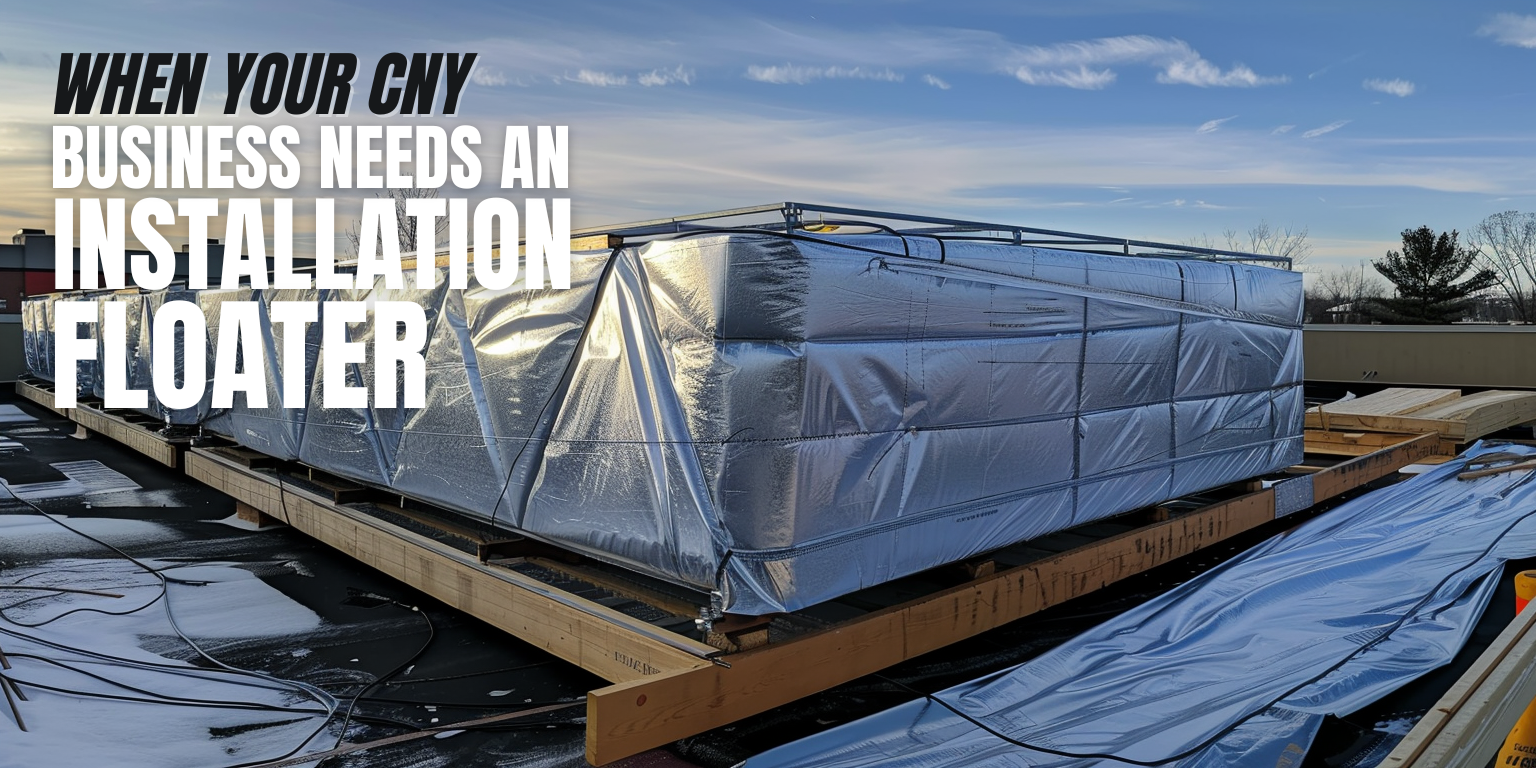How an Installation Floater Can Safeguard Your Customer Orders
March 11th, 2024
5 min read

Ever worry about that expensive granite countertop getting damaged before it reaches the kitchen? Or those custom blinds mysteriously vanishing en route to the office? As a contractor or subcontractor, unexpected losses during installation can be a nightmare.
But fear not! The installation floater is your secret weapon, providing composure and financial protection from warehouse to final destination.
We’re Horan, and we’ve been helping CNY professionals like you with customized business policies since 2009. We tailor insurance to the way you operate your business.
This article delves into the world of installation floaters, explaining how they work, what they cover, and why they’re essential for any business entrusted with valuable items during the installation process. We’ll also explore key coverage examples and shed light on the nitty-gritty details like limits and deductibles.
So, whether you're installing high-end appliances, intricate window treatments, or bulky HVAC systems, rest assured. With the right installation floater in place, you can focus on delivering flawless results, knowing your precious cargo is safeguarded every step of the way.
Let’s dive in and discover how this valuable insurance policy can empower your business and eliminate installation anxieties.
What is An Installation Floater?
An installation floater is a type of insurance that covers the items you’re delivering and installing for your customers. It protects you from losses that may occur during the transit and installation process.
For example, suppose you’re a contractor who specializes in wood flooring. You have a customer in Hastings who wants you to replace their entire downstairs floor. You order the wood from a supplier and store it at the jobsite until you’re ready to install it.
However, what if the wood gets damaged or stolen while onsite at its final destination, but not yet installed? An installation floater can cover you for such risks and save you from paying out of pocket.

How an Installation Floater Works
Frank, a Liverpool contractor, wins a bid on an installation project and gets the items. He then delivers those items to the customer’s property. Frank wants to install them as soon as possible. Once he does that, the installation floater covers the following things, if he has enough coverage.
All the items he installs at the final destination and any materials he uses for the installation.
For example, Frank buys cabinets and wood flooring and installs them. The installation floater covers the cabinets and flooring as well as the screws, nails, glue, or anything else he needs to finish the job.
Get Coverage Before the Installation
Your main policy doesn’t cover the items you’re installing at a job site. They’re not your property and they’re not on your premises. You need installation floater insurance to protect the items that are in your care, custody, and control before you install them.
This is common for contractors who are subcontractors for builders.
For example, suppose Alberici is building a house for someone and hires you to do the flooring. The house is under construction and you expect to install the flooring by August 1st. You order the items in advance and get them on time.
But there’s a problem at the house and you can’t install them yet. You have to wait. You don’t know how long. They’ll update you on that later. Now you have the items in your warehouse and you have a problem.
That’s why you often see a lot of materials in the garage of a house that’s under construction. They’re there well before they’re needed.
Sometimes you see the refrigerators and the appliances too. You may wonder why those items aren’t more secure and safe. Well, part of the reason is this. Some carriers don’t cover the items if they’re at your permanent location, even for one day.
Other carriers give you 60 days to store them temporarily at your place, but not more. As the contractor, you think, I have an installation floater, it covers the items at the house where I’ll install them. So I’ll take them there and put them in the garage. Then if something happens to them, I have some insurance coverage.
Key Coverage Example 1: Window Coverings
Getting coverage before the install is very important for anyone who does any kind of installation, such as window coverings. For example, blinds can be expensive if you do a whole floor of an office building.
Say there’s a big company that rents 30,000 square feet in Utica. They want new blinds for all their windows.
You say, “OK, sure. I’ll order them.”
They say, “Don’t ship them here. We have no space for them. They may get lost on the ground floor. We’re on floor 37 and we don’t know who will get them there. So we won’t let them in.”
You say, “OK, fine. I’ll get them myself. I’ll have them sent to me.”
When you receive the shipment, you drive them over there. The blinds are totally exposed at this point.
So it’s very important to make sure that if you’re a contractor who installs things for others and you get the items yourself, you have the protection you need to cover what you order.
The amount of coverage you get from your carrier depends on the endorsement you choose. They may offer you a percentage of the total value of the items you order, such as 10, 20, or 25 percent.
For example, if you order $100,000 worth of items and your carrier offers you 10 percent, they will only cover up to $10,000 in case of loss or damage. But there is always a limit to the coverage. You need to be careful about how much you order, where you take it, and how you insure it.
And usually it has a separate deductible that’s lower than your main policy because it’s similar to an inland marine policy at that point. You cover the items in many places, not just your premises. So you can set the deductible at a different level.
This is a good piece of extra coverage for someone who is in this field. For example, a painter may not need it as much. Even if they ordered a lot of paint for the house and it was all damaged, it may not cost enough to make an insurance claim.
But another kind of contractor who orders big things for a home build, addition, or just a general update, it can get expensive. They may have a lot of things to deal with at the moment.
Key Coverage Example 2: HVAC Equipment
An HVAC company is another type of business that can benefit greatly from installation floater insurance. They deal with large and costly units that are often installed on rooftops. They need extra help or equipment to transport and set them up. This exposes them to a lot of risk and expense during the installation process.
If something happens to the units before they are installed, such as theft, damage, or vandalism, the HVAC company could face a huge loss. That is why they need to get an installation floater before they start the installation.
This way, they can protect themselves from the financial consequences of losing or damaging the units they’re responsible for. That’s why an HVAC company needs an installation floater to safeguard their interests.
The installation floater provides important extra protection for contractors and subcontractors installing expensive items for customers. Be sure to understand the details of your policy's coverage, limits, and deductibles.
We Can Tailor an Installation Floater Policy for Your Specific Contracting Business
Don’t let the stress of potential damage during installations shadow your expertise. An installation floater is your shield, deflecting the financial blows that can cripple projects and dent your reputation.
It’s not just about safeguarding expensive materials. It’s about safeguarding your ability to deliver on promises and build trust with clients. Imagine the confidence you’ll exude knowing every item, from delicate chandeliers to bulky generators, is covered from the moment it leaves the warehouse until it’s securely installed.
Picture the composure you’ll maintain when the unexpected arises, knowing you have a responsive insurance partner by your side.
On the other hand, overlooking an installation floater can leave you exposed, facing financial burdens and jeopardizing your hard-earned reputation.
Don’t let a preventable mishap become a roadblock to your success. Get the security you deserve and give your business the upper hand with an installation floater. It’s an investment in your future, a safeguard against unforeseen circumstances, and ultimately, a key to unlocking stress-free installations and satisfied clients.
Click the Get a Button below to have us tailor a policy to your specific CNY operation.
Daniel is an accomplished content creator. He has been working in publishing for almost two decades. Horan Companies hired Daniel as its content manager in November 2022. The agency entrusted its messaging to him. Since then, Daniel has written insurance articles, service pages, PDF guides, and more. All in an effort to educate CNY readers. He's helping them understand the world of insurance so they can make informed decisions.


























